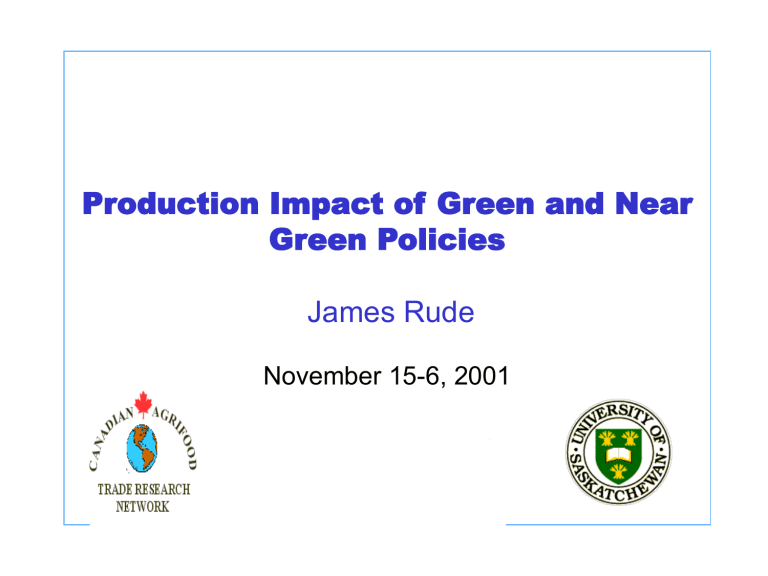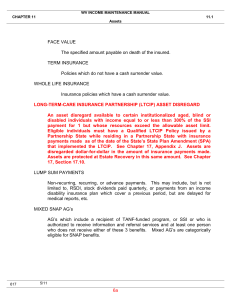Implications for Agriculture of China's Accession to the WTO James
advertisement

Production Impact of Green and Near Green Policies James Rude November 15-6, 2001 Outline • Distribution of domestic support • Distribution of green box support • Production effects of compensatory payments • When green isn’t green How EU support stacks up AMS limit 72 1998/99 Notification Pieces of Green 1% 11% 28% Public stock holding General Services 1% Decoupled income 1% 6% Regional development Domestic food aid Investment aid 26% Disasters Retirment programs 0% 26% Enviroment 1998/99 Notification: Total Green 19.2 Billion Euro Blue on Blue max h, x, pc f c ( xc hc ) po f o ( xo ho ) wc xc wo xo sc hc so ho ( H G hc ho ) gG FOC: pc f c / hc sc po f o / ho so pc f c / xc wc 0 po f o / xo wo 0 H G hc ho 0 • equal compensation payments, sc=so cancel out neutrality • absence of compensation payments from MVPx equations input use, and yields, are independent of payments Blue on Blue (continued) • Do comparative statics on this system of equations hc / sc 0 and ho / so 0 hc / so 0 and ho / sc 0 • Jointness caused by shared fixed input, H,crops are strong substitutes. Crop specific subsidies may off-set each other or at least reduce the impact. • Compensatory payments are partially decoupled (yield yes; area no) with off-setting effects on substitute crops Blue Man Group • Several studies examine the empirical impact of per hectare compensation payments on crop mix – Guyomard, Baudry, and Carpentier (1996) France • Similar approach but uses dual with restricted profit function analytical results similar (s’s may cancel) • Evaluate impacts on basis of crop specific profit functions estimated for pre-CAP reform period – supply response small due to off-setting cross effects and fixed total area – Oude Lansink and Peerlings (1996) Netherlands • Estimation with pre-CAP reform data – 25% reduction in area payments 16% cereal and oilseeds area Blue on Blue (continued) – Moro and Sckokai (1999) Italy • • • • Similar estimation approach Post CAP reform data Professional Producers Low responsiveness to compensatory payments – cross elasticities with respect to compensatory payments are negative and small Heart Ache on Heart Ache • Even if the s’s cancel each other out, they still represent a direct transfer to agriculture • Are these transfers production neutral if the recipient can not affect the size of the pay-out? – idea of lump sum transfers • When isn’t a direct payment neutral? – – – – Wealth effects reduce risk aversion Transfer reduces the variability in income Wealth transfer relaxes debt constraints Expectation effect: increase base in anticipation of new pay-out related to this new higher base – Long Run entry and exit decisions Till the End of Time 1% Decoupled programs: agri-monetary aids 26% General Services: – research, pest and disease control, extension, inspection, market promotion, infrastructure services – public good arguments optimal value of service • too little worse than too much • what is public good: non-rival/non-exclusive Desperate Measures 0.1% public stock holding - surplus reduction 1% domestic food aid - surplus reduction 1% disaster assistance - low slung safety net 6% retirement program - structural adjustment -direct payments - unintended consequences A Redder Shade of Green 28% Investment Aids - where is market failure? - economy wide macro structural adjustment -OK - infrastructure? 26% environmental aids - direct payments compensating for compliance - can design these programs to transfer a lot of money or little money and get same result 11% regional development - where is the market failure? - AoA contradicts the SCM



